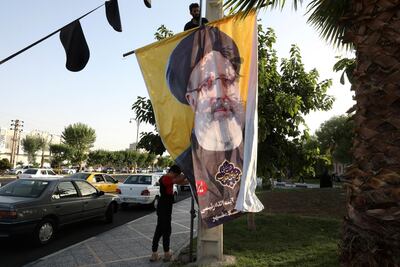Iran's four presidential candidates wrapped up their final campaign push on Wednesday before a Thursday campaign blackout began ahead of the country's elections.
Election centres will open at 7am local time on Friday but a poll released by the Iranian Student Polling Association showed that the turnout is expected to be at an historic low. Only 40 per cent of Iranians said they planned on voting.
The poll gives front runner Ebrahim Raisi, a hardline former judicial head, a comfortable lead. He is projected to win 63.7 per cent of the vote while Abdolnasser Hemmati, the only moderate in the field, is expected to get just 4.2 per cent.
This year’s election is largely seen as a referendum on the administration of President Hassan Rouhani.
The nuclear deal, the ailing economy and a growing poverty rate were the focus for most of the candidates. None of the candidates were able to offer concrete solutions to many of Iran's economic failures, but most of the candidates did say they would continue with the nuclear negotiations in hopes of getting economic sanctions lifted. Even hardliner Mr Raisi endorsed the Vienna negotiations, although he took aim at the Rouhani administration saying talks should be conducted by a "powerful government".

Underpinning the campaign trail was voter frustration with the narrow list of candidates, nearly all of whom were hardline and conservative politicians, which led to calls for a boycott of the election.
The Guardian Council's list, backed by Ayatollah Ali Khamenei, included only two reform-minded politicians, one of whom dropped out 48 hours before the polls open in a bid to boost the chances of Mr Hemmati.
The worry that many would heed the call for a boycott, as well as other factors behind the projected low turnout, pushed many of the country’s officials to spend much of the weeks and days before the election simply urging people to vote.
Mr Khamenei, Foreign Minister Javad Zarif and other well-known figures took to the airwaves and social media to call on Iranians to vote.
Prominent reformist leaders like Mir Hussein Mousavi, Mehdi Karroubo, former president Mohammad Khatami and others also stepped into the fray, urging Iranians to vote and lending their support for Mr Hemmati.
Mr Hemmati appeared on social media app Clubhouse on Wednesday night to speak to supporters. He told listeners he believes the hardline candidates have been asked to drop out of the race to solidify Mr Raisi's lead due to fears that Mr Hemmati could get enough votes to win.
He also tweeted that hardliners have "realised that the people have woken up and will not remain silent. They realised that it is not possible to become president with minority elections and minority votes".
But despite efforts to get people to vote, very little excitement has been whipped up among the electorate.
Sheida, an Iranian citizen, told The National that she has no plan on voting and feels disillusioned by the lack of change. he admitted, however, that some who had not planned to vote may still do so.
"Some people I know are having a last-minute panic that they can't just sit back and not do anything," she said.
Despite the possible change of heart, she said most conversations she has had with friends about voting end up with more reasons to sit out the election than to cast a ballot that she says may not even get counted.
Although the results of Friday's elections will not be known until early next week at the soonest, Mr Raisi's comfortable lead leaves many Iranian voters with the impression that the results are pre-determined.











